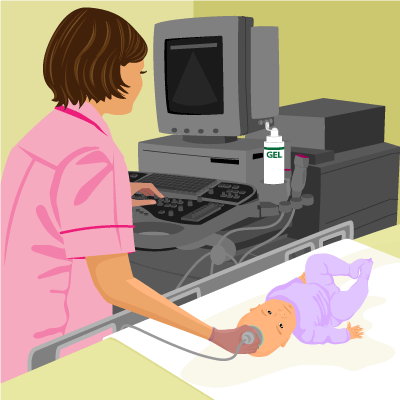What Is an Ultrasound?
An ultrasound scan is a medical test that uses high-frequency sound waves to create live images from the inside the body. Also called a sonogram or sonography, ultrasounds let doctors see the body’s soft tissues, which X-rays can’t do.
Doctors order ultrasounds for many reasons, such as to look for the causes of pain, swelling, and infection. Ultrasound scans are safe and painless.
What Is a Head Ultrasound?
A head ultrasound uses sound waves to make images of the brain.
An ultrasound machine sends sound waves into the head and images are recorded on a computer. The black-and-white images show the internal structure of the brain, including the ventricles (the fluid-filled cavities in the brain) and the blood vessels.
Head ultrasounds are done only on young babies, whose skull bones have not completely grown together (that is, they still have a soft spot on top of their head, known as a fontanel). This is because bones block the passage of ultrasound waves. The fontanel provides an opening for the sound waves to get through and reach the brain.
Why Are Head Ultrasounds Done?
Doctors order head ultrasounds when there's a concern about neurological problems in an infant. Premature babies who need intensive care often get head ultrasounds to rule out neurological problems from their early birth, such as bleeding in the brain (intraventricular hemorrhage, or IVH) or injury to the white matter of the brain surrounding the ventricles (periventricular leukomalacia, or PVL).
A doctor also might order a head ultrasound for a baby with:
- an unusual increase in head size
- a bulging fontanel
- any neurological symptoms
Head ultrasounds can help doctors diagnose:
- bleeding in the brain tissue or ventricles
- hydrocephalus
- a mass in the brain, such as a tumor or cyst
- suspected complications of meningitis
If your baby is in the hospital and can't easily be brought to the radiology department, a portable ultrasound machine can come to the bedside. This is often the case in a neonatal intensive care unit (NICU). The scan can be done with the baby on their stomach or back, or even in a parent's arms, if needed. You can feed your baby, or offer a pacifier or favorite toy for comfort.
What if I Have Questions?
If you have questions about the head ultrasound or what the test results mean, talk to your doctor.



